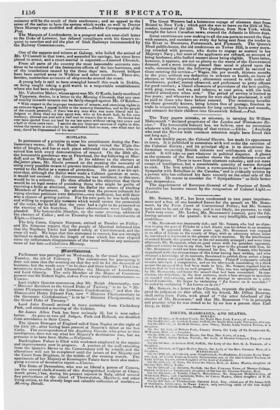Mr. Somers, 11I. P., has been condemned to two years
imprisonment and a tine of one hundred francs for the assault on Mr. Beaumont, by the Paris Court of Correctional Police; but Mr. Somers took care to be out of the way, and is not likely, we presume, to visit Paris very soon. Mr. Ledru, Mr. Beaumont's counsel, gave the following account of the quarrel : it is not very intelligible, and scarcely credible— "Sir. Beaumont was immensely rich ; and Mr. Somers, who had no objection to play the part of Pylades to a rich friend, was his debtor to an immense amount. It appeared that, some years ago, Mr. Beaumont was engaged in an alftir of honour in the county of Sligo, with an adversary whose name lie considered it irrelevant to the present case to mention. By the interference of inutual fuiends, the quarrel was in the end amicably arranged ; and some time afterwards Mr. Beaumont, when on good terms with his quondam opponent, uddresseil a letter to him to say that, had he gone to the ground with him, he (Mr. Beaumont) would not have returned his fire. Mr. Somers, who became acquainted with the circumstance of this letter having been written, and who obtained a knowledge of its contents, threatened to publish them unless a large hUill of money woe paid him by Mr. Beaumont. Plaintiff indignantly refused toenter into such a compromise, and on his afterwards mentioning to a third person the proposal that had been made to him, Mr. Somers tequired him to declare that he had made no such proposal. This, too, was indignantly refused by Mr. Beaumont ; :ind hence the assault that had been committed. In conclusion, the de!iwelint, in the first instance, made a base attempt to speculate on scandal awl calumny, and ended by an attempt to speculate on a cold. blooded homicide. He began by exclaiming " La Source ou le module! he ended by exclaiming " La bourse ou In vie!"
Mr. Somers, in a letter to the Chronicle, requests the public to suspend its judgment on this affair, till his friend, Mr. Dillon Browne, shall arrive from Paris, with proof of "the utter falsehood of the slander of Mr. Beaumont," and that Mr. Beaumont "is in principle and practice what he was stated to be by no less a person than Earl Grey, in 1826."


























 Previous page
Previous page